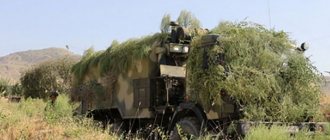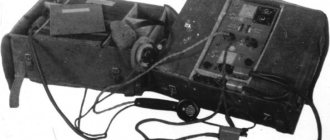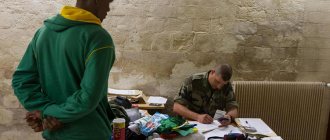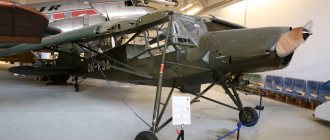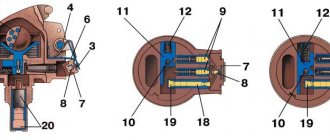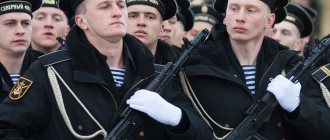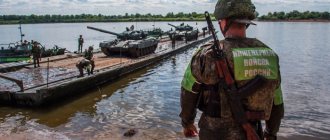What is a company and the history of formation
The next element of dividing people into groups is an independent combat unit under the leadership of an officer. It is assigned goals and tasks of varying complexity, issues equipment (weapons, equipment and property), builds internal order and principles of service (in accordance with general military regulations).
Note! In the RF Armed Forces, a formation is distinguished by the fact that its commander is always an officer. A smaller group - a platoon - can be led by a warrant officer (depending on the type of troops).
The word itself is of foreign origin. This is what organized brigades of European mercenaries called themselves in the Middle Ages and the Renaissance. Russian tsars in the 17th century from time to time recruited them for service and along the way created “foreign regiments” of archers and warriors with Western equipment.
New formations of the Russian army were divided into separate units, also called companies in the Western version. After the establishment of the Russian Empire, the name in various parts of the army was sometimes changed to “company”. Later, by the 20th century, the previous designation finally returned to the troops.
Attention! In other branches and types of troops, other terms are used to unify this level. For example, in aviation - a flight or squadron, in artillery - a battery.
However, at all times, the meaning of the term was unchanged - this was the name of a detachment of soldiers from the general army, capable of conducting independent actions if necessary (without communication with higher leadership).
At the moment, “speed and efficiency” in battle and in the rear are instilled in a larger unit, a battalion. However, it is usually divided into self-governing connections in household terms.
Note! That is why in most units a detachment is organized and property is maintained within the company.
How to get to the service
Motorized rifle formations are universal ground units capable of performing almost all tasks assigned to them. This means that soldiers entering service in motorized rifle troops must have the following qualities: endurance, the ability to quickly adapt to the situation and carry out orders exactly.
Resistance to all weather and climatic conditions is especially valued. Getting into the service is quite simple - there is no special selection. The main thing is to have health not lower than category B4. Motorized rifle troops do not belong to the elite category, so no special knowledge or skills are required.
Thus, a motorized rifle company is a universal ground formation capable of performing a wide variety of tasks. Usually it consists of no more than 120 people. They are mainly engaged in ensuring order in the entrusted territory and are used both in defense and on the offensive.
Varieties of mouth
The compounds differ mainly in their specialization. The most common are military branch formations. They are the basis of military units that carry out direct tasks for the defense of the country. Examples would be groups such as:
- Motorized rifle company is the largest, including 3-4 infantry platoons;
- Tank company - several crews of combat vehicles, 30-40 people;
- An airborne company is a team of paratroopers for dropping behind enemy lines or quickly arriving at dangerous areas of combat operations.
Note! In peacetime, the formation may not be fully staffed; during periods of hostilities, the number increases significantly.
More variety is found among support units:
- Providing information: communications company, reconnaissance company;
- Preservation of people and equipment in combat readiness: sanitary teams, repair company;
- Covering troops from a surprise attack: security unit, RCBZ company;
- Movement of personnel, delivery of goods: material support company, automobile company.
Such groups provide services in a specific specialty. Their numbers vary and depend on the need for personnel. Where fighters with a narrow focus are required or where equipment is being maintained, there are fewer people.
The name of the unit also depends on the decision of the unit commander. An engineering company can easily turn out to be a repair company, and a medical reinforcement company can easily turn out to be a medical team according to documents.
Attention! Separate companies are also allocated. What distinguishes them is their “independent” status - they act as an independent military unit. For example, an air defense radar company may be located separately from a regiment.
General principles for forming the number of units
The personnel in any of the units is formed taking into account military necessity and is strictly fixed by the staffing table.
General principles for creating military formations:
- department - 5-10 people;
- platoon - 10-50 people, consisting of 3-6 sections;
- company - 40-150 people, which includes 3-6 platoons;
- battalion - 150-600 people, consisting of 34 companies.
The number of people in a company depends on the type of military service to which the unit belongs, as well as on military necessity. In peacetime, the minimum number of companies is usually used; in wartime, the maximum or close to it.
Responsibilities of the company commander and deputy
The group is led by an officer holding the rank of captain or senior lieutenant. If we are talking about a unit operating as a separate military unit, then the commander may be a major.
The responsibilities of the unit commander are wide. He controls a fairly large formation, and its commander serves as a coordinator in the department. In this regard, he is responsible for holding meetings and summing up the results of combat training.
He also organizes the service and daily activities: class schedule, outfit preparation, cleaning procedures, provision of property.
He is also the representative of his personnel before the headquarters of the regiment or battalion. He presents candidates for promotions and incentives to his management, and makes his proposals for management.
The deputy commander is usually a lieutenant (sometimes 1 step higher in rank). His task is to assist the commander in training soldiers. If the “company commander” gives orders and instructions, it is the deputy officer who controls their implementation.
Another officer works in a similar direction - the deputy for work with personnel (or “political officer”). He is responsible for the moral preparation and training of soldiers, instilling in them patriotism and a positive attitude towards service. He organizes mass events, makes sure that the fighters do not lose heart and are provided with everything they need.
Important! It is extremely rare that a single person holds the position of deputy; usually these are officers - platoon commanders.
The company also includes a deputy commander for weapons or a technician with the rank of warrant officer (sometimes an officer). He monitors weapons - small arms, vehicles, combat vehicles, mechanisms, repair equipment and tools.
The army through the eyes of a soldier
Nutrition
It seemed that everything went well, the commission was greeted with dignity, and she was pleased with the cleanliness in the company. We also checked the dining room, which was nothing to complain about, since the food that day was unusual: in addition to one spoon, they also provided forks, and instead of plastic plates and mugs, they provided porcelain ones.
But I want to say something about the food right away. We have not had a single case where a soldier was left without breakfast, lunch or dinner due to any severe punishment. But if you didn’t have time to eat, then no one is to blame. So I had to swallow all the food without chewing.
We go to the dining room as if on a holiday. Individual platoons and companies march in columns of three to the beat of drums performed by an orchestral company. Two soldiers stood in the center of the parade ground and drummed on two drums, a small one and a large one. We definitely have to make a march around the parade ground, since opposite the parade ground there is a headquarters (after all, someone from the authorities could be there, so we had to show military valor in front of him), and then move in the direction of the dining room.
When we reached and lined up in front of the entrance to the dining room, the company duty officer reported to the unit duty officer that the company had arrived for meals in the amount of forty-five people, after which he commanded:
- Company! Take off your hats!
- From the left, one at a time, run, march!
Here a new test begins: from which side will they be sent to the dining room first, the left or the right? During the formation, everyone is trying to become the last one, there is more and more hope to dive into the warmth early and sit down first at the table. After all, whoever sat down last did not have time to eat everything, since there was a team, regardless of whether everyone had eaten or not. “Company, get up, finish eating!” The responsible officer makes sure that most of the soldiers eat, because the whole company will not wait for two soldiers. Everyone ran from one column to another. Therefore, the company duty officer often brought the “fighters” back.
In the hall we hang up our pea coats (insulated winter jacket), leave two soldiers for security and go up to the second floor to the dining room. Here they divided into two types of meals: regular, mainly for all soldiers, and additional food, the very name of which speaks for itself - this is for those who are underweight. Fifteen people were included in this list from our third battalion. Somehow they wanted to put me there, but I never got in because I gained one kilogram. The food is basically the same, only the portions are a little larger than usual.
In the dining room, they lined up in one long column, took trays and took turns going to serve, received food and carried it on trays to the tables and sat down in groups of four or six. They were seated mainly according to calls - “old people” with “old people”, “skulls” with “skulls”, etc. Additional food served itself, that is, the duty outfit set the tables. In the center of the table there was a pot of porridge, a teapot, and a plate with six lumps of sugar and butter. There were also empty plates and glasses for six people. Each soldier served his own food.
The food was tasty, but not enough; I never got full. In my life I never thought that I would be haunted by a constant feeling of hunger: what I ate and what I didn’t eat is the same thing.
The most luxurious dinner was on Oath Day, even now I can’t forget it. After all, parents were visiting, and they were invited to our dining room.
On major holidays we always indulged: a little less than half a mug of juice, two cookies or two caramels.
After a week in the army, we ate everything we hadn’t eaten before in civilian life.
The soldiers' rations are very thoughtful. If they had given a little more food, everyone would have forgotten the phrase “an eternally hungry soldier.”
What we also lack is sweets, and this main “lack” is felt by everyone. If you hold on at first, then it turns into an obsession. You pounce on any candy, any gingerbread like a child.
In civilian life, I put two and a half teaspoons of sugar in my tea, and in the army, when I had the option to buy sugar (or when they gave me sugar instead of cigarettes), I made myself tea at night in the quarters, and seven spoons were not enough.
Before the army, no one told me that I wouldn’t eat as much as I should. After all, here you can’t get enough of yourself: three meals a day, breakfast at seven in the morning, lunch at fifteen o’clock, dinner at nineteen hours and thirty minutes - and not a crumb in your mouth anymore.
And in the fall, a “famous” dish called “bigus” appears in the diet, made from sour stewed cabbage and a small amount of stew or boiled fish. The tart smell of this “bigus” was so strong that during the next meal the previous aroma had not yet disappeared from the dining room. And for lunch, sometimes they make cabbage soup from “bigus”. In civilian life, this dish is called “bigos” (Bigos is a modern Polish dish, prepared from only sauerkraut, from sauerkraut and fresh cabbage, or only from fresh cabbage. Bigos is also called any stewed sauerkraut with pork) and it is much tastier.
It was basically a regular dish for dinner or breakfast. After a sour “bigus” we set our teeth on edge, severe heartburn appears, from which the entire military unit suffers. We tried everything we could to get rid of it: we ate cigarette ashes, tried not to eat black bread. But since we didn’t eat enough, we were forced to eat everything they gave us and endure this wild heartburn.
After all, taking bread or other food from the canteen with you and carrying it in your pockets is not allowed. And if suddenly one of the “grandfathers” or officers finds supplies and, God forbid, sees you chewing, then you will be punished.
Something similar happened once. After dinner, my distant fellow countryman Kolya Sirinov (tall and healthy, could always stand up for himself) constantly managed to steal a piece of black bread from the dining room and always hid it under the mattress. He always shared with me and with other colleagues. And then one day, during a morning inspection, sergeants walked past the crew quarters and checked whose beds were poorly made. Everyone’s mattresses were turned over, including Kolyana’s. And he had a piece of bread hidden under the blanket, which he had not yet eaten. Naturally, no luck, this piece was discovered.
The sergeant gathered and lined up everyone who slept in this cockpit, that is, ten people.
- Whose bed? - the sergeant asked in a raised tone.
“Mine,” answered Kolya.
- Break down!
Kolya, with frightened eyes, left the ranks with uncertain steps.
- You are a bastard! Are you being fed poorly?
Kolya lowered his head and could not say anything.
- Answer when asked! - the sergeant barked at the top of his voice and struck at the “soul” (chest). Kolya crouched down from the blow, because he did not expect the sergeant to do this.
- Well, “fathers”, I told you about the bread, now hang yourself! This “schmoozer” has let you down, and now you will all suffer for his misdeeds, and the culprit will only watch.
The sergeant took out army cigarettes, poured tobacco from there directly onto this black bread, gave it to each soldier and said:
“Now eat a hearty meal, don’t be shy, no one will beat you for it!”
Well, I had to eat it. Many ate everything. When I took a bite and started chewing, I felt nauseous.
Sergeant says:
- Well, what are you chewing, go ahead, swallow for your comrade.
I start to swallow, but the piece doesn’t fit into my throat. I felt even worse, the sergeant began to examine the mouth of each soldier. So, like a hamster, I hid the chewed bread and tobacco behind my cheeks and pretended to swallow it, and quietly put the rest in my pocket.
When the execution was over, we ran to the toilet. I stood at the toilet for half an hour and spat everything out, my mouth was burning like that of the Serpent Gorynych; I don’t know how my body survived...
After everything that happened, the soldiers gathered at the showdown site. Kolya sat on the edge of the stool with his head bowed, feeling guilty. A healthy “fighter” from our cockpit approached him and said:
- Why the hell did you hide bread under the mattress? You could have distributed it to everyone at night, and this incident would not have happened. And then we ate this bitter tobacco for you, and you relaxed.
“But I didn’t do it on purpose, understand, I didn’t think it would happen this way, and the sergeant deliberately turned you against me, and you know that very well.” If you think that I deserve punishment, then please, you can hit me. Come on, let's...
The indignant big man dealt several blows to the offender’s abdomen and left the cockpit. Kolya bent over and, suddenly unable to bear it, began to cry from injustice.
All my colleagues and I just looked at what was happening with a detached look and could not say anything.
A couple of days later the same incident occurred, only the soldier was from the first platoon. After the command “Finish eating!” Get up!”, this soldier fulfilled only half of this command, he stood up, but as he walked, he finished eating what he didn’t have time to eat. Seeing this, the old-timers punished him as follows: they sat him down at the table and forced him to eat several bowls of porridge, eat a loaf of army black bread and wash it down with several glasses of jelly.
In general, it’s scary to see what hunger can do to people.
One day after lunch, the company duty officer called me and said:
— Go to checkpoint-1 to the visitors’ room, someone has come to see you.
- Who could come to me?
- How could I know? Go and find out! - the sergeant said indignantly.
I ran straight to checkpoint-1. I look - my friend Dimon, who lived in Moscow, is standing near the visitors’ room. He and I sat on a bench and talked for about an hour. Then the sergeant came and said:
- Let’s go to the company, is the company commander with the “dogs” already looking for you?
I began to say goodbye to Dimka, and he handed me a bag full of “freebies”. “Intelligence” stood nearby, taking everyone’s best for themselves. The reconnaissance team was the strongest and most muscular, because they recruit not ordinary people, but those with sports ranks and train them with great physical exertion so that they are even stronger. That's why everyone was afraid of them.
I was at a loss, not knowing what to do. A sergeant from my company came up to us and whispered to my friend to go further behind the fence and hand over the bag near checkpoint-2. There was no “intelligence” there.
Dimka did just that. Before reaching checkpoint 2, he noticed this sergeant who was already waiting for him there. My friend walked up to the fence and quickly began handing over the bag. She caught on the pins that stuck out along the entire fence. And at the bottom of the bag were nuts, most of which had spilled out. However, everything valuable and tasty was preserved, and it’s good that the “intelligence” didn’t get anything.
C - the most
L - best
U - lesson
F - life
B - was
A - army
After that, the old-timers and I went to the storeroom and there, in one fell swoop, we “imprisoned” everything that was handed over to me. It was the most delicious and long-awaited dinner.
I stuffed everything I could into my pockets and handed it over to the whole company, that is, to those who were not at this luxurious table. And those who didn’t get it didn’t remain offended, because everyone understands that this is an army.
